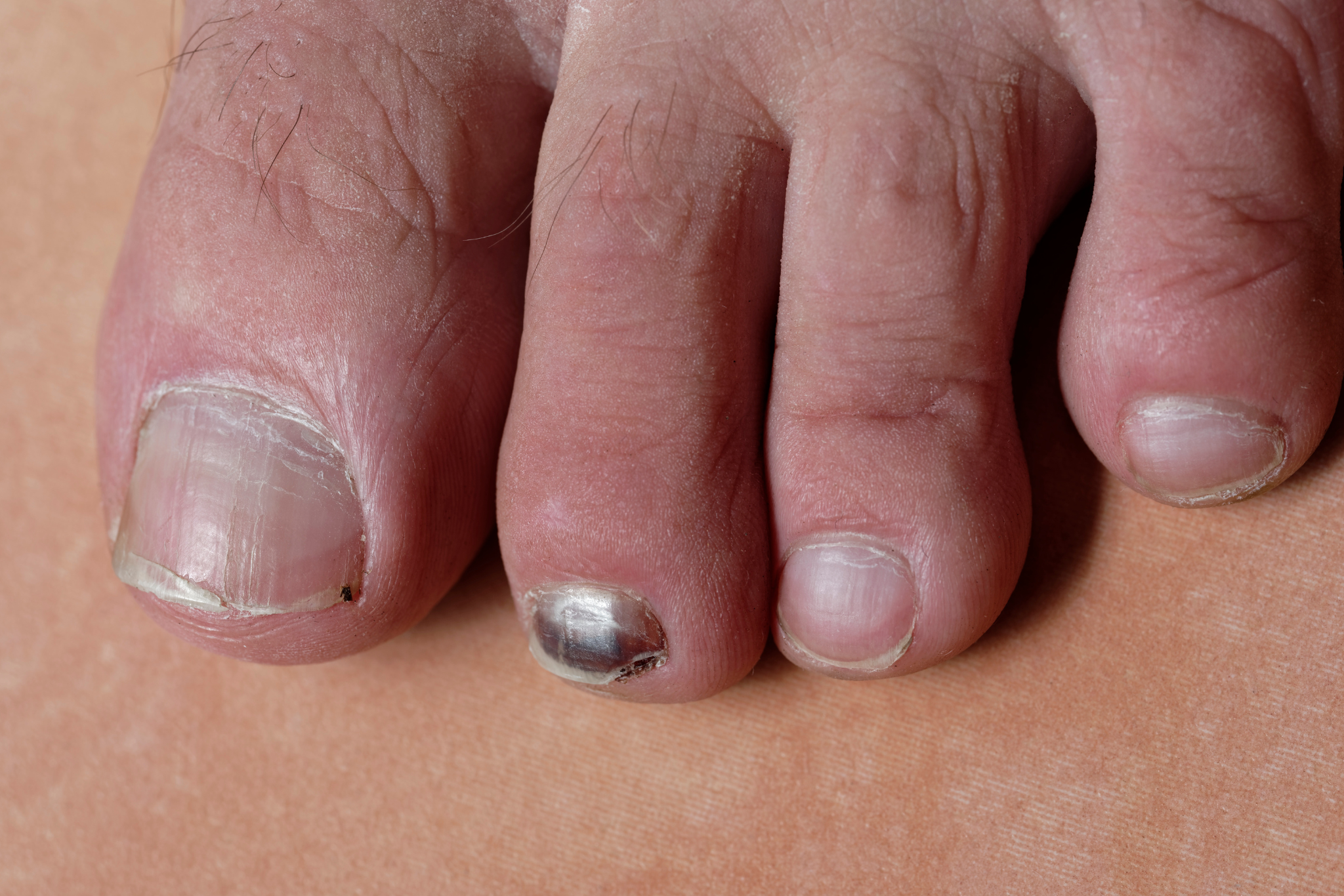Causes of Black Toenails
A sudden change in nail color can be alarming. While sometimes a simple bruise, a black toenail might signal a more serious issue. Understanding the causes and appropriate treatments is crucial for maintaining healthy feet.
Causes of Black Toenails
Toenail discoloration can be caused by various factors:
- Blood Under the Nail: Known as a subungual hematoma, this occurs when blood from an injury seeps into the nail bed, turning the nail dark. This can happen from repetitive trauma, such as consistently hitting your toes against your shoes, or from a sudden injury, like dropping something heavy on your foot. This type of discoloration is usually accompanied by pain, especially if the blood pools and increases pressure beneath the nail.
- Fungal Infections: Fungi can darken the nail, especially when debris accumulates underneath. This condition, known as onychomycosis, can make the nail thick, brittle, and discolored. It’s often accompanied by an unpleasant odor and may cause the nail to separate from the nail bed.
Underlying Medical Conditions
Several health issues can lead to black toenails:
- Diabetes: This can cause poor circulation, leading to nail discoloration and increasing the risk of infections.
- Anemia: Low iron levels can affect nail health, leading to changes in color and texture.
- Heart Disease: Impacts blood flow to extremities, including toenails, potentially causing discoloration.
- Kidney Disease: This can result in a variety of changes in nail color and health due to toxin buildup.
- Melanoma: A rare but serious form of skin cancer that can develop under the nail, causing it to turn dark. Melanoma is potentially deadly and requires immediate medical attention.
- Nutritional Deficiencies: Lack of essential nutrients such as vitamins and minerals can lead to changes in nail color and health.
When to See a Doctor
It’s important to seek medical attention for a black toenail if you experience:
- Pain or Discomfort: Persistent pain or discomfort should not be ignored. This can indicate more severe underlying damage or infection.
- Underlying Conditions: If you have diabetes, heart disease, kidney disease, or another serious health condition, you are at greater risk for complications and should seek professional advice.
- Not Healing on Its Own: If the discoloration persists and does not improve over time, it’s crucial to have it evaluated. Persistent discoloration can indicate a chronic issue that needs treatment.
Black Toenail Treatment
Treatment varies depending on the cause of the discoloration:
- Fungal Infections: These can be treated with topical antifungal creams, ointments, or medicated nail polishes. In some cases, oral antifungal medications may be necessary for more severe infections. Keeping the feet clean and dry, and using antifungal powders can help prevent recurrence. Of course, the most effective treatment option is our laser therapy!
- Trauma to the Toe: Often, injuries will heal on their own. However, if blood pooling under the nail causes discomfort, draining the fluid can relieve pressure and pain. This involves creating a small hole in the nail to allow the blood to escape, followed by cleaning and bandaging the area to prevent infection. This procedure should be done by our seasoned team to avoid further complications.
- Doctor’s Visit: Necessary if you have an underlying condition or if the toenail is not healing on its own. Dr. Victoria Melhuish can assess your condition to determine the extent of the damage and rule out other causes like fungal infections or melanoma. Appropriate treatment can then be administered to restore your nail health. If the underlying cause is an underlying health condition, addressing that condition will be part of the treatment plan.
Recovery involves patience, as the nail will take time to grow out of the darkened color. In the case of a fungal infection, ongoing treatment might be required for several months. To prevent future injuries, wearing properly fitting shoes is essential. Tight or short footwear can pinch and damage the nails, so ensure your shoes provide ample space. Additionally, avoid walking barefoot to protect your feet from injuries.
Preventing Black Toenails
Prevention is always better than cure. Here are some tips to keep your toenails healthy:
- Wear Properly Fitting Shoes: Ensure your shoes are neither too tight nor too loose. Shoes that fit well prevent your toes from repeatedly hitting the front of the shoe and causing trauma.
- Trim Your Nails Properly: Cut your toenails straight across and not too short to avoid ingrown nails and other issues.
- Maintain Good Hygiene: Keep your feet clean and dry. Use antifungal powders if you are prone to fungal infections.
- Protect Your Feet: Wear shoes in public places like pools and gyms to prevent fungal infections. Avoid walking barefoot to prevent injuries.
- Monitor Your Health: Regular check-ups can help manage underlying conditions like diabetes, heart disease, and kidney disease, reducing the risk of black toenails.
Seeking Professional Help
If your toenails are turning dark without an obvious cause or if you experience pain, it’s important to have your feet examined. This can help alleviate discomfort and check for serious conditions that could endanger your foot health.
Request an appointment or more information from us at Sierra Foot & Ankle in Carson City, Nevada. Reach out through or call us at (775) 783-8037. Let us help you solve the mystery of your black toenails and get you on the path to clear, healthy, and happy nails!
Get In Touch
Address
2350 South Carson St
Suite 3
Carson City, NV 89701
Contact
Call: (775) 783-8037
Fax: (775) 782-3787
OPT-IN To Text:
By texting our office at
(775) 783-8037 from your mobile phone, you are consenting to receive SMS text messages from our staff. Reply STOP to unsubscribe.
*Read our Privacy Policy & Terms and Conditions.
Social




© Sierra Foot & Ankle. All Rights Reserved. Privacy Policy.
Web Design by CP Solutions. Marketed by VMD Services.

